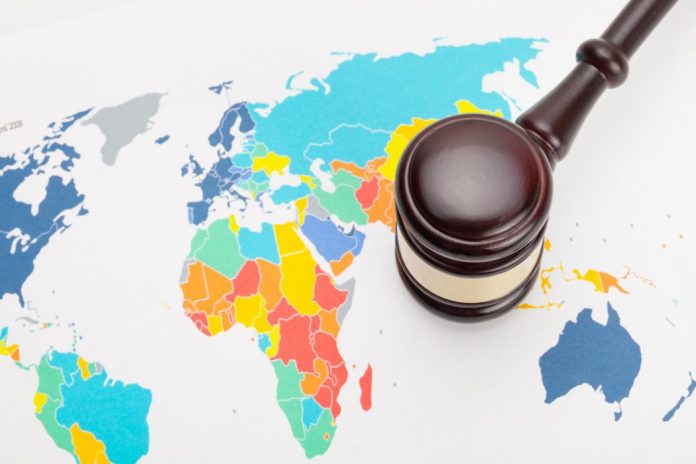This article is written by Rachit Garg from University of Petroleum and Energy Studies, Dehradun. This is an exhaustive article, aiming to give a brief introduction to the concept of International Law and its various aspects.
Table of Contents
Introduction
Every society, irrespective of its population, makes a legal framework (law) under which it functions and develops. It is permissive in nature as it allows individuals to form legal relations with rights and duties and restrictive in nature as it punishes the wrong-doers. These laws are referred to as Municipal laws. The world today requires a framework through which interstate relations can be developed. International Laws fill the gap for this.
The term ‘International law’, also referred to as Laws of Nations was first coined by Jeramy Bentham in 1780. Every country is referred to as ‘state’ in International Law.
Meaning
The modern international law system is a product of only the past four hundred years bearing witness to the influence of various writers and jurists of sixteen to eighteenth century, who formulated some of its most fundamental principles.
International laws are a set of rules, agreements and treaties that are binding between countries. Countries come together to make binding rules that they believe will benefit the citizens. It is an independent system of law existing outside the legal framework of a particular state.
What is the aim of International law?
The existence of international law is the result of increased interstate engagement. It mainly aims to maintain international peace and security among different states. It also helps in:
- promotion of friendly relations among the member states (members of the International community, for example, United Nations),
- providing for basic humanitarian rights,
- to solve International problems through international cooperation,
- to refrain the state from using threat or force over the territory of any other state to provide for right to self-determination to people, and
- to use peaceful methods to settle international disputes are few of its functions.
Who are the subjects of International Law?
It is referred to as entities who have a legal personality, with certain rights and duties under the international legal system.
State is considered to be the primary and original subject of international law. However, it also regulates the actions of other entities:
-
- Individuals – Common people of any state are also believed to be the subject of international law.
- International Organizations – It is an association of states, established by a treaty between two or more states. International Organizations too have a legal personality and are considered to be the subject of international law. For example, the United Nations.
- Multinational Companies – They own and operate their corporate entities in at least one other country aside from the place where it was incorporated, therefore it is established in more than one nation.
All are considered to be subjects of international law and are enshrined with both rights and duties.
However, in the past, states were the only subjects of the international law but with the increase in the scope of the international law, many other entities like the one discussed above have been given international personality. So now the question arises, whether they may be treated as the subjects of international law and if they are given the international personality, what is the criteria determining their qualification to be the subject of the international law. So there are different theories for determining the same. The most prominent of them are:
Realist Theory
According to this theory, only the Nation/States are considered to be the subject of the international laws. It relies on the principle that it is for the nation/state that the concept of international law came into existence. These nations/states are distinct and separate entities, capable enough to have their own rights, obligations and duties, possessing the capability to maintain their rights under international law.
Prof. L. Oppenheim being the strong supporter of this theory believes that as the law of nations is primarily a law between the states, to that extent, subjects of the law should be nations only.
However, the theory has been criticized on the fact that it fails to explain the case of slaves and pirates as under international law, slaves have been conferred with some rights, while the pirates are treated as enemies of mankind.
Fictional Theory
Supporters of this theory suggest that the subjects of international law are the individuals only and that legal order is for the well-being of the individuals. They firmly believe that the Nation/state are nothing but aggregate of individuals as subjects.
Prof. Kelsen is the supporter of the theory and believes that the duties of the states are ultimately the duty of the individuals of the states and there is no difference between the international law and municipal law and have been made to be applicable on the individuals only.
Even if the theory of Kelsen appears logically sound, it is seen that the international law’s primary concern is with the rights and duties of the states.
Functional Theory
Both the Realist and the Fictional Theory take on an extreme course of opinion, but, according to Functional Theory, neither state nor individuals are the only subjects. They both are considered to be the subjects of modern International law as they both have recognized rights, duties and obligations. Along with them, several other entities, like African Union, have been accepted as subjects of international law.
In the present times, individuals have been conferred with certain rights and duties, for example, International Covenant on human rights. Moreover, it is agreed that international organisations are also the subjects of international law. The International Court of Justice held that the United Nation is an international person and is a subject of international law, capable of having rights and duties.

Branches of International Law
-
Jus Gentium
Referred to as ‘laws of nations’ in Latin, considered to be those set of rules part of those portions of law mutually governing a relationship between two nations and do not form part of a legal code or a statute.
-
Jus Inter Gentes
Referred to as ‘law between the peoples’, considered to be those agreements and treaties, mutually accepted by both countries.
Various Scholars on International Law
Various eminent scholars, international jurists, subject experts gave their interpreted definition of International law. Most popular among them are as follows:
- According to Prof. L. Oppenheim, “Law of Nations or International Law is the name for the body of customary and conventional rules which are considered legally binding by the civilized states in their intercourse with each other.”
- As per Torsten Gihl, “The term International Law means the body of rules of law, which apply within the International Community or society of States.”
- As per J.L. Brierly, “The Law of Nations or International Law may be defined as the body of rules and principles of action, which are binding upon civilized states in their relations with one another.”
- Gray said, “International law or the Law of Nations is the name of a body of rules which according to their usual definitions regulate the conduct of states in their intercourse with each other.”
- In Queen v. Keyn (1876), Lord Coleridge, C.J., defined International law as “The law of nations is that collection of usages which civilized States have agreed to observe in their dealings with one another.”
Is International Law really a law?
It is one of the most controversial questions that has been debated and on which jurist’s opinions hugely differ. One view considers International law not a true law, rather, a code of rule of conduct backed by morality. On the other hand, International law is considered to be a true law and is regarded as a law, similar to that of ordinary laws of a state, binding upon the citizens.
Austin’s View – International law is not a true law
According to Austin, law is the command of the sovereign punished by sanctions in case the command is violated by the individual. There must be a legislative authority enacting the rule of conduct and enforcing physical sanction. So based on what he said, it can be concluded that any rule which is not enacted by any superior or legislative authority, cannot be regarded as a law and moreover, if laws are violated, sanctions must be imposed.
Based on that, it can be said that rules are only morally and ethically valid if they aren’t issued by any sovereign authority. If we apply this theory to International law, we will see there is no legislative power over the society, based on which Austin concluded that International laws are merely based on ethics and morality and are not true law.
Oppenheim’s View – International law
According to him, laws are nothing but a body of rules for human conduct within a community, which can be enforced by an external power if there’s a common consent of the community for the same. Based on what he said, we can conclude that, firstly, there must be a community, secondly, a body of rule of conduct governing the community must be there and thirdly, common consent among the community for the rules to be enforced power must be present. From this, we can conclude that it’s not necessary that rules should be enacted by a legislative authority within the community for them to be legally binding.
Types
International Law can be broadly divided into three types: Public International law, Private International law and Supranational Law.
Public International Law
It refers to rules and regulations governing international relations between different states and international institutions. It sets rules concerning all mankind: the environment, international business, the ocean, human rights, etc.
Public international laws apply to international organizations like the United Nation (UN) and the World Trade Organization (WTO).
Aspects of Public International Law:
- Custom – consistent state practices relying on opinio Juris, that is, belief, that is to be carried out there is a legal obligation to do so.
- Standard behaviour globally accepted, jus cogens.
- Legal Codes referred to as treaties.
For example, the Kyoto Protocol, a climate agreement, has many countries as signatories for reduction of their greenhouse gases emissions in order to protect the environment.
We can take Convention on the Rights of the Child, a convention, ensuring the protection of child rights in the signatory countries.
The Sovereignty of states
It’s the idea that the state is supreme and it can’t be a subject to other states’ rules and regulations. No state can be forced to sign a treaty. They are free to accept or decline to sign an international treaty or agreement.
Private International Law
It is also referred to as, ‘Conflict of laws’ and the phrase was first used by Ulrich Huber in his book- ”De Conflictu Legum Diversarum in Diversis Imperiis” in 1689.
Private International Law establishes and deals with the relationship between citizens/private entities of different countries. People from different parts of the world are often interacting with each other forming legal relations.
For example, an American man and an Indian woman were married in India and now live in Los Angeles. In case they ever want a divorce, the rules of private international law will determine where they will be required to go, either to the US or to an Indian court to get divorced.
The same is applicable to business as well as. Globalization has led to business activities between various countries. For example, if you are defrauded by a foreign country’s personal/private entity or organisation, then the rules of private international law will apply if you want to sue.
Supranational Law
It refers to a situation in which a nation/state surrenders to a court of their choice their right to make certain judicial decisions, which will take priority over the decision made by the national courts. This distinguishes it from the Public International Law. For example, the supranational law is represented by the European Union (EU). All the courts within the member states of the EU are overruled by the European Court of Justice in accordance with EU laws.
Merits/Demerits of International Law
Merits
- State’s Interest Protection
It can be said without a doubt that International laws have protected the interests of states, especially of those, which have no power to protect their own interests.
For example, the World Food Programme, a part of the UN, which is a subject of international law, is a large humanitarian agency which fights hunger worldwide and delivers food assistance in case of emergencies.
- Human Being Welfare
It has played a vital role in the welfare of human beings.
For example, there are various international treaties for the promotion of fundamental human rights, justice and equality, like the Universal Declaration of Human Rights.
- Unity and Strength
This law has brought unity among different nations/states as no one state can be separated from the other. Every state has become the need of the other one.
For example, the problem of global warming. Every country emits greenhouse gases which is further contributing to global warming and the impact of the same will be felt by all the countries. So, no country can combat global warming alone and will need international laws and cooperation to curb the problem.
Demerits
- No Apparent Authority
There is no authority for the enforcement of the law. Only the International Court of Justice is present but it can’t settle certain matters. Moreover, once a decision is given by it, there is no such power or authority which can get it enforced.
- No Legislative Machinery
As the international laws are based on treaties and conventions, they are interpreted by states according to their self-interests.
- Lack of Effective Sanctions
There is no fear of sanctions, which has resulted in laws being violated frequently by the states.
- Inability to Intervene
According to Article 2(7) of UNO Charter, UNO cannot interfere in the domestic matters of the states. It has been seen in such situations, international laws are ineffective and weak.
Conclusion
International law is a set of rules which are binding between countries and aims to ensure security and peace among various nations. The subject of question under international law isn’t only the Nation/state but can be an individual also. Moreover, it has emerged through a number of sources which are codified in Article 38 of the ICJ statute, according to which, customs, treaties and general principles are considered to be the source of International Law. International law is there to maintain world order and peace, settle various disputes among different nations/states and individuals and to provide fundamental rights. However, there are still various shortcomings due to which international relations are suffering.
Students of Lawsikho courses regularly produce writing assignments and work on practical exercises as a part of their coursework and develop themselves in real-life practical skills.
LawSikho has created a telegram group for exchanging legal knowledge, referrals, and various opportunities. You can click on this link and join:
Follow us on Instagram and subscribe to our YouTube channel for more amazing legal content.
 Serato DJ Crack 2025Serato DJ PRO Crack
Serato DJ Crack 2025Serato DJ PRO Crack










 Allow notifications
Allow notifications


